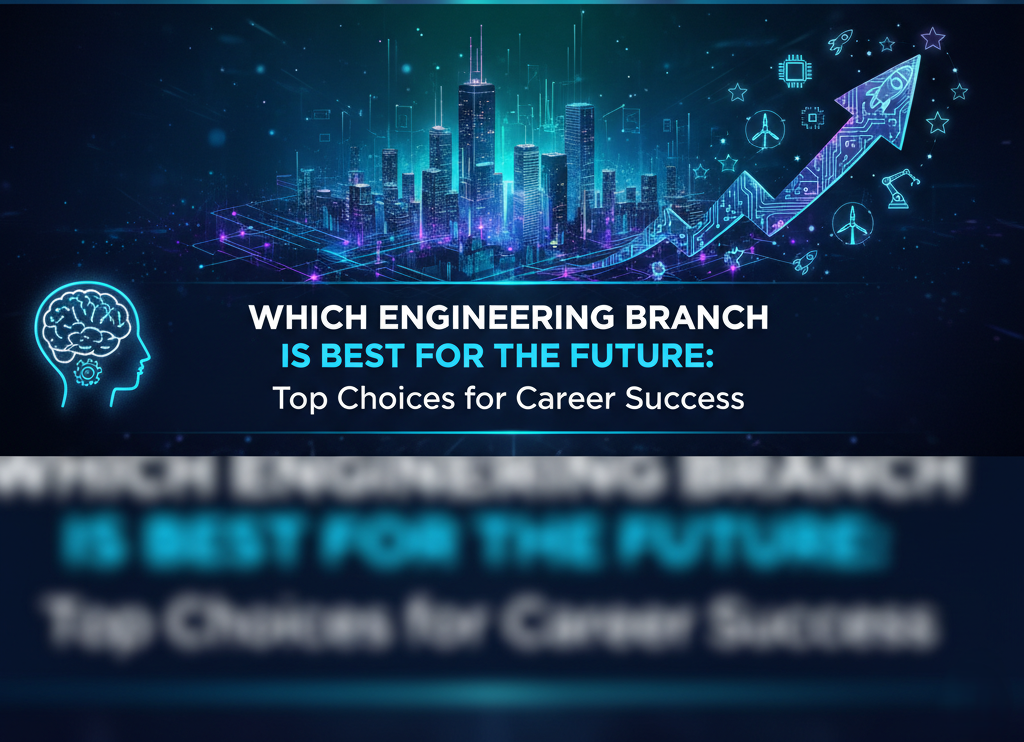
Picking the right engineering pathway isn't about what's popular today - it’s about ensuring you have a promising future in fields that are shaping and changing our planet. So, choosing the top engineering branch for the future is not all about following tradition, but looking for innovative fields which can offer career opportunities for the long term. The world needs new specialisation areas to answer the challenges in technology, ranging from sustainability to artificial intelligence, while traditional core areas like Mechanical, Civil, and Electrical engineering are still current.
This article focuses on the most popular engineering branches and how they’re accommodating the demands of today and tomorrow, so you can make an informed choice on which engineering course to opt for in 12th which is best for the future. From artificial intelligence and robotics to green energy and medical technologies, we will take a look at the high-demand engineering disciplines that will shape careers of the future.
High-Demand Engineering Fields
-
Computer Science and Engineering (CSE)
CSE has been the best engineering branch for the future as it drives every industry in this digital age. This discipline with specialisations in AI, Machine Learning, Data Science and Cyber Security is at the leading edge of development.- Scope Ahead: AI-influenced automation, blockchain, cloud technology, and big data are developing at an exponential rate.
- Careers: Software Developer, Data Scientist, AI/ML Engineer, Cybersecurity Professional, Cloud Architect.
-
Robotics and Mechatronics Engineering
As automation takes centre stage in industries, robotics is definitely one of the top engineering branches. This is a cross-disciplinary area where mechanical, electrical, and software engineering merge.- Looking Ahead: Robot applications in medical (surgical robots), manufacturing, logistics, and self-driving cars.
- Careers: Robotics Engineer, Automation Engineer, Control Systems Engineer, Research Investigator.
-
Electronics and Communication Engineering (ECE)
ECE is essential for the future of connected life. 5G, the Internet of Things, to mention a few, have guaranteed their place amongst the high-demand engineering fields.- Future Focus: Embedded systems, smart devices, chip design, and wireless technology.
- Career Opportunities: IoT Solutions Architect, Embedded Systems Engineer, Network Analyst, Chip Designer.
-
Biomedical Engineering
Blending technology and medical science, biomedical engineering is considered the best engineering branch for future healthcare. Its reach is also widening internationally, with an ageing population and an ongoing need for medical advancement.- What’s Next: Advanced prosthetic, diagnostic, wearable, and drug delivery devices.
- Jobs: Medical Device Designer, Clinical Engineer, Research Scientist, Biotech Innovator.
Core Engineering Fields
-
Mechanical Engineering
Despite being traditional, mechanical engineering is one of the top engineering branches because it’s versatile. It is now embracing green energy, mechatronics, and sustainable technology.- Career Options: R&D in Automotive, Renewable Energy Engineer, and HVAC.
-
Civil Engineering
Civil engineering has been transformed into a future-oriented discipline, particularly with smart infrastructure and environmentally friendly urban planning. It is certainly one of the engineering courses after 12th that promise demand as long as cities continue to expand.- Career Options: Structural Engineer, Smart City Planner, Environmental Engineer.
-
Chemical Engineering
Chemical engineering ensures a place in high-demand engineering fields by driving innovation in pharmaceuticals, renewable energy, and materials science.- Career Opportunities: Process Engineer, R&D Scientist, Materials Specialist.
-
Agriculture Engineering
Perhaps in some years to come, someone versed in the so-called "science" of agriculture will be needed. We are embarking on a phase where agricultural concerns need to be properly addressed. Currently, agricultural technology is developing on a profit-maximising trajectory — often at the cost of the climate and our health (e.g., toxins from fertilisers). We are, and will be, in dire need of agricultural innovations to feed the people of the earth, while caring for the planet. Such is the skill that agricultural engineering might bring to bear.- Career Opportunities: Irrigation Technician, Food Production Worker, Agriculture Specialist.
Future-Proof Skills to Develop for Success in Engineering
Excelling in your chosen engineering path requires more than academic knowledge. It’s about mastering a mix of technical and professional skills. While each branch demands unique expertise, there are some core skills every engineer should develop to keep pace with the futuristic demands:
- Solid Technical Fundamentals: Mathematics, physics, and core engineering principles provide the backbone for problem-solving.
- Digital Literacy: Coding, data analysis, and software tools are taking on greater significance in all fields.
- Analytical and Problem-Solving: Engineers must have a methodical approach to each problem and think of novel and innovative solutions.
- Creativity & Innovation: The ability to think beyond standard solutions makes you stand out in competitive fields.
- Communication & Teamwork: Good communication with multi-disciplinary teams is indispensable in industry projects.
- Adaptability: With technology evolving quickly, staying flexible and open to learning new tools or concepts is key.
By focusing on these, you can set yourself apart and thrive in the best engineering branches for the future.
Emerging Trends in Engineering Careers
Engineering continually adapts to changing global challenges and technological breakthroughs. Knowing the trends enables you to align your career path in high-demand engineering fields. Some key trends include:
- AI & ML: Revolutionising industries such as healthcare, finance, and automation.
- Sustainable Energy Solutions: Increasing roles in solar, wind, hydrogen, and green tech engineering.
- Robotics & Automation: Moving into every sector from manufacturing to logistics to medical procedures.
- Smart Cities & Infrastructure: There will be a requirement for civil and environmental engineers with specialisation in sustainability.
- Biotechnology & Biomedical Advances: Engineering innovations improving diagnostics, prosthetics, and treatments.
- 5G & IoT Expansion: Creating opportunities in electronics, communication, and connected systems.
Staying up to date with these trends enables you to choose the best engineering branch for future growth and stay ahead in the job market.
How to Choose the Best Futuristic Engineering Branch?
Although getting an idea about the best engineering branch for the future is very important, the final judgment must be yours, and it should be based on your personal interest and long-term goals. Students should consider closely what they are most excited about and what kinds of problems they want to solve.
- Personal Interests: Consider if you are excited to help build smarter cities, revolutionise healthcare with medical devices, or develop sustainable technology.
- Basics: If you are good at Maths, Physics, and Analytical ability, you can get through to any branch.
- New-Age Skills: Today’s engineering world values coding, data interpretation, and digital literacy just as much as traditional technical knowledge.
- Practical Exposure: Exploring internships, academic projects, and industry mentorships can help you identify which of the engineering courses after 12th aligns best with your passion.
Conclusion
In the end, there is no single best engineering branch for the future, as the right choice depends on aligning your personal interests with industries that promise growth and innovation. Whether you choose to study computer science, robotics, civil, or biomedical engineering, there is an opportunity for you, so long as you are dedicated to lifelong learning and sharpening of skills. This guide is a starting point to explore a variety of pathways, understand university programmes, and gain insights from industry experts. Remember, engineering is not just about securing a job; it’s about using creativity and knowledge to build a smarter, sustainable, and impactful future.
FAQs


